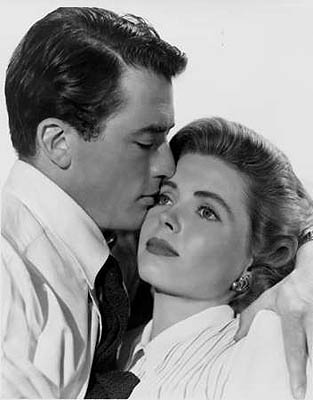As I was saying… Ted Nelson’s mother happens to be Celeste Holm, one of the greatest actors of stage and screen in the twentieth century. The film for which she won an Academy Award – for best supporting actress – was Gentleman’s Agreement.
This film iteslf was a polemic about antisemitism. (a “gentleman’s agreement” is an unspoken pact – in this case the unspoken agreement in much of WWII-era America not to allow Jews into housing, social clubs, restaurants, etc.). The set-up was quite simple: Gregory Peck plays a reporter who has just moved to New York and is asked to do a story about antisemitism in America. To get the inside scoop, he poses as a Jew. As Peck’s character experiences antisemitism first-hand, he (and the audience) gets a raised consciousness. The lesson he learns is quite specific: The real enemy is not the obvious racist, but rather the ordinary “good citizen” who goes along with racism.

Peck and McGuire share a moment
The timing of the film couldn’t have been more fortuitous: It was released in 1947 – just two years after the end of World War II. As America learned just what had been done to European Jews in the war, the nation was in a mood to be sympathetic toward Jews, even though antisemitism was still rampant in the U.S.. The film won three Oscars and was nominated for another five.
There are several women in the film, and therein lies today’s tale. Peck’s main love interest was played by Dorothy McGuire, a beautiful actress who radiated a kind of youthful femininity. Another woman he encounters, played by the aforementioned Celeste Holm (Ted Nelson’s mom), is perhaps the only character with whom we in the twenty first century can immediately like and sympathize. Not just as written, but also as played by Ms. Holm, she is enormously self-aware, open-minded, brilliant, with a gracious wit and a wry and subtle sense of irony that one associates not with characters in films of the post-war era, but more perhaps with the characters of Joss Whedon and Candace Bushnell.
The reason I think her character is so important is that the film’s explicit plot of unspoken antisemitism laid bare is accompanied by a secondary conflict: The film plays Dorothy McGuire’s beautiful and sheltered heiress Dorothy McGuire against Celeste Holm’s brilliant, fun and independent minded career gal, to an effect that speaks deeply to the theme of the story, but in a way that I’m guessing was not intended by the film’s creators.
We conclude tomorrow on, appropriately, Mother’s Day.